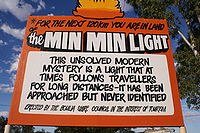- Min Min light
-
Min Min Light Terminology 
Sign at Boulia, QueenslandCoined by Aboriginal myth[1] Definition An unusual light formation found in Aboriginal myths and Australian folklore[1] Signature An unexpected light with no apparent local source. Mainly reported in North Eastern Australia. Status Natural phenomena See also Fata Morgana Min Min Light is the name given to an unusual light formation that has been reported numerous times in eastern Australia.[1][2] The lights have been reported from as far south as Brewarrina in western New South Wales, to as far north as Boulia in northern Queensland. The majority of sightings are reported to have occurred in Channel Country.[1]
Stories about the lights can be found in aboriginal myth pre-dating western settlement of the region and have since become part of wider Australian folklore.[1] Indigenous Australians hold that the number of sightings has increased alongside the increasing ingression of Europeans into the region.[1] According to folklore, the lights sometimes follow or approached people and have disappeared when fired upon, only to reappear later on.[1][2]
The light's existence as a phenomenon has been confirmed to be Fata Morgana,[3] though there remains debate over their source.[1] Various explanations have been put forward, ranging from optical illusions and piezoelectrics to luminescent animals.[4]
Contents
Appearance and behaviour
Accounts of the light appearances vary, though they are most commonly described as being fuzzy, disc-shaped lights that appear to hover just above the horizon.[1][2] They are often described as being white, though some accounts describe them as changing colour from white to red to green and back again. Some accounts describe them as being dim, others describe them as being bright enough to illuminate the ground under them and to cause nearby objects to throw clearly defined shadows.[1][2]
Some witnesses describe the light as appearing to approach them several times before retreating. Others report that the lights were able to keep pace with them when they were in a moving motor vehicle.[1][2]
Hypothesis
Various hypotheses have been put forward to explain the lights. Explanations include:
Bioluminescence
It has been hypothesized that the light may be the result of insects swarming that have taken on bioluminescencent characteristics after being contaminated by naturally occurring agents found in local fungi,[1] or of species of owl with their own naturally occurring source of bioluminescence.[4]
Geophysical lights
A second hypothesis is that the lights are the result of known geophysical phenomena, such as piezoelectrics.[1] Though in many cases lights are reported from areas without favorable geological conditions.[1]
Refraction
A third hypothesis is that the lights are the result of an optical illusion known as a Fata Morgana, causing remote lights or objects to appear closer, and in a less recognizable form.[1]
See also
References
- ^ a b c d e f g h i j k l m n o Pettigrew, John D. (March 2003). "The Min Min light and the Fata Morgana. An optical account of a mysterious Australian phenomenon" (PDF). Clin Exp Optom 86 (2): 109–20. doi:10.1111/j.1444-0938.2003.tb03069.x. PMID 12643807. http://www.uq.edu.au/nuq/jack/MinMinCEO.pdf.
- ^ a b c d e Kozicka, M.G. "The Mystery of the Min Min Light. Cairns", Bolton Imprint
- ^ Salleh, Anna (2003-03-28). "Mystery of the Min Min lights explained". News in Science (Australian Broadcasting Corporation). http://www.abc.net.au/science/news/stories/s818193.htm.
- ^ a b Silcock, Fred F. (2004). The Min Min Light: The Visitor Who Never Arrives. http://www.owlpages.com/articles.php?section=Product+Reviews&title=Min+Min.
Categories:- Atmospheric ghost lights
- Weather lore
- Australian Aboriginal culture
- Australian folklore
- UFO-related phenomena
Wikimedia Foundation. 2010.
